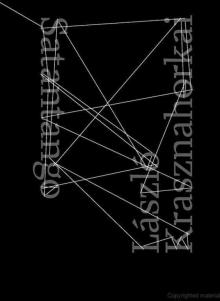Read Satantango Storyline:
At long last, twenty-five years after the Hungarian genius László Krasznahorkai burst onto the scene with his first novel, Satantango dances into English in a beautiful translation by George Szirtes.Already famous as the inspiration for the filmmaker Béla Tarr’s six-hour masterpiece, Satantango is proof, as the spellbinding, bleak, and hauntingly beautiful book has it, that “the devil has all the good times.” The story of Satantango, spread over a couple of days of endless rain, focuses on the dozen remaining inhabitants of an unnamed isolated hamlet: failures stuck in the middle of nowhere. Schemes, crimes, infidelities, hopes of escape, and above all trust and its constant betrayal are Krasznahorkai’s meat. “At the center of Satantango,” George Szirtes has said, “is the eponymous drunken dance, referred to here sometimes as a tango and sometimes as a csardas. It takes place at the local inn where everyone is drunk. . . . Their world is rough and ready, lost somewhere between the comic and tragic, in one small insignificant corner of the cosmos. Theirs is the dance of death.” “You know,” Mrs. Schmidt, a pivotal character, tipsily confides, “dance is my one weakness.”From BookforumA bleakly absurdist, voluptuously written saga of abject disintegration on the muddy nowheresville of the Hungarian puszta, Satantango had a sardonic prescience. Supposedly structured on the forward-backward steps of the tango, the novel glides from one consciousness to another, ultimately revealed as a kind of Mobius strip. —J. Hoberman Review“On occasion, Krasznahorkai's sentences seem to swell and deflate; each clause seems to twist in its own direction. His sentences are, by turns, lovely, brutal, bombastic, ironic, and precise.” (Bookslut )“Like something far down the periodic table of elements, Krasznahorkai’s sentences are strange, elusive, frighteningly radioactive. They seek to replicate the entropic whirl of consciousness itself and, in the case of Eszter, to stop its “onward rush” entirely.” (Jacob Silverman - New York Times Book Review )“He is obsessed as much with the extremes of language as he is with the extremes of thought, with the very limits of people and systems in a world gone mad — and it is hard not to be compelled by the haunting clarity of his vision.” (Adam Levy - The Millions )“What prevents Satantango from devolving into a mere exercise in clever derivation, however, is Krasznahorkai’s fervent mission to thoroughly mine the mysteriousness, and potential miraculousness, of a seemingly corrupt physical reality. His wry, snake-like sentences produce—or unspool—layer upon layer of psychological insight, metaphysical revelation, and macroscopic historical perspective...” (The L Magazine )“His prose is formed like a fractal: self-similar patterns where every sentence exceeds its topological dimensions to become a microcosm of the entire work. We definitely hear Beckett in him.” (Full Stop Magazine )“Think of “Satantango,” then, as an Eastern European blues album that looks to affirm the coarse texture of life rather than auto-tune it into something smoother or more amendable to wish fulfillment.” (Salon )“Krasznahorkai's sentences are snaky, circuitous things, near-endless strings of clauses and commas that through reversals, hesitations, hard turns and meandering asides come to embody time itself, to stretch it and condense it, to reveal its cruel materiality, the way it at once traps us and offers, always deceptively, to release us from its grasp, somewhere out there after the last comma and the final period: after syntax, after words.” (The Nation )“László Krasznahorkai’s novel Satantango is an argument for the vitality of translation. It is bold, dense, difficult, and utterly unforgettable.” (The Daily Beast )“A writer without comparison, László Krasznahorkai plunges into the subconscious where this moral battle takes place, and projects it into a mythical, mysterious, and irresistible work of post-modern fiction, a novel certain to hold a high rank in the canon of Eastern European literature.” (The Coffin Factory )“Krasznahorkai is a poet of dilapidation, of everything that exists on the point of not-existence.” (The Independent )“Whether he's inside the minds and machinations of his characters' scheming heads, tramping through the muddy streets from one ruined destination to another, or speculating on the value of existence under such Godless conditions, Krasznahorkai proves himself to be capable of bringing anything to life, and Satantango's pages are teeming with it.” (Critical Mob )“Utterly absorbing–it dramatises with great invention the parching of the human imagination and wrings an almost holy grandeur from a tale of provincial petulance.” (New Statesman )“The serpentine motion that is neither progress nor repetition, the forward and backward steps of the ‘tango’ explicitly structure Satantango.” (The Quarterly Review )“I love Krasznahorkai’s books. His long, meandering sentences enchant me, and even if his universe appears gloomy, we always experience that transcendence which to Nietzsche represented metaphysical consolation.” (Imre Kertesz )“Krasznahorkai is the contemporary Hungarian master of the apocalypse who inspires comparisons with Gogol and Melville.” (Susan Sontag )“The universality of his vision rivals that of Dead Souls and far surpasses all the lesser concerns of contemporary writing.” (W. G. Sebald )Pages of Satantango :
